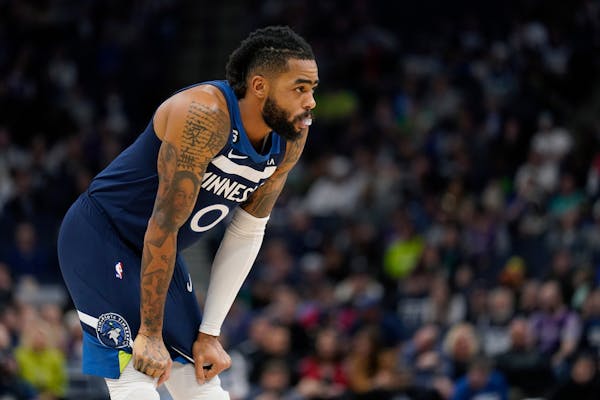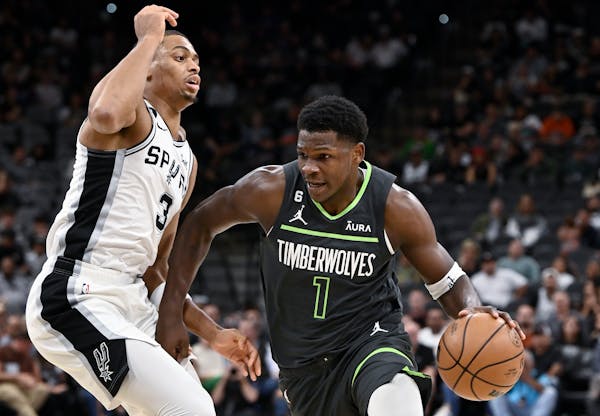Seated next to Jordan McLaughlin (plus-six) for his postgame news conference, Anthony Edwards (minus-12) picked up the boxscore from the Timberwolves' 116-107 loss to Phoenix and examined the plus-minus column.
He noticed a pattern: The Timberwolves' starters all had minus numbers, and all in double digits at that. Most of the Wolves' bench all had positive numbers — and so did Phoenix's starting lineup.
It seemed like an epiphany had come to Edwards in that moment.
"From the looks of it, it's telling me that when we're in the game, we're losing. And when they're in the game, we've got a better chance of winning," Edwards said. "I don't like the sound of that, so we're going to figure it out. That's crazy, bro. We're all in the minus, and y'all all positive."
He directed that last part at McLaughlin, who again was one of the catalysts for a strong bench performance that, with help from Edwards' 24 points, cut an 18-point Phoenix lead to 87-85 with 8 minutes, 35 seconds remaining in the game.
The Wolves look like two different teams at the moment, and Tuesday's loss to Phoenix showed a stark contrast that carried over from Sunday's loss to the Spurs. When the bench is on the floor, the Wolves look like the group that had so much success last year. Players such as McLaughlin (nine points, three assists) and Naz Reid (13 points, plus-10) run coach Chris Finch's offense the way it's supposed to look, the way it looked for the second half of last season.
"They're sharing the ball," Edwards said. "They don't care who scores. That's the biggest thing. They don't care who scores. They all want to see each other shine in that second group."
Then the first unit comes back on the floor — and looks like it has barely played together. It's a painful brand of basketball to watch and has led to an underwhelming 4-4 record against a slate of opponents that was not supposed to be this challenging.
“Listen, I think I'm going to go back with the guys at certain times. ... I'm not going to sit here and second-guess every substitution I make in the last five minutes of the game.”
After the Wolves cut it to two on back-to-back threes from Edwards, Phoenix coach Monte Williams called timeout to put in his starters (except for the injured Deandre Ayton). Finch got his starting unit back in there — as the Wolves went on to commit turnovers on six of the next seven possessions. Game over. Cameron Johnson (plus-17) had 29 points for Phoenix on seven threes while Chris Paul (plus-18) had 15 points, 12 assists and eight rebounds.
D'Angelo Russell (a team-low minus-20) continued his recent miserable run with five points on 2-for-8 and is shooting 28% over his past three games. Finch said Russell has to play more off the ball as the offense should run more through Karl-Anthony Towns (minus-12), who matched Edwards with 24 points.
"[Russell has to] facilitate pace and movement and being more of a threat off the ball," Finch said. "We're really good when we're playing through KAT at the top of the floor. I think it's something we got to do more, just kind of flow into that.
"He's just got stay confident in his shot. I saw him turning down some open looks out there. Just got to stay confident. He's a really, really good shooter."
Rudy Gobert (minus-14) had one shot attempt, seven points and nine rebounds, even without Ayton in the lineup. Jaden McDaniels (four points, minus-18) couldn't stay out of foul trouble.
When asked after the game what improvements he had seen from the starters, Finch offered a sobering analysis.
"Well, there hasn't really been a whole lot of growth with that unit just yet," Finch said.
But like Sunday, Finch went back to the starters at the close of the game. This is his dilemma early in the season. The Wolves need their starters to figure it out. This is the group that they expect to lead them deep into the playoffs. But at this point in the season, the need to play them is coming at the cost of winning games when the bench has played better basketball.
Finch didn't sound like he was going to change that philosophy any time soon.
"Listen, I think I'm going to go back with the guys at certain times," Finch said when asked if he thought about sticking with a mixed lineup down the stretch. "... I'm not going to sit here and second-guess every substitution I make in the last five minutes of the game."
When he first started talking after the game, Edwards preached patience; the Wolves just need some time. Then he looked at the boxscore, and his tone of voice changed. There was suddenly more urgency where it sounded like there was little before that.
"Our starting five was all minuses … our bench was plus, plus, plus," Edwards said. "Yeah, the starting five, we'll figure it out."
The Star Tribune did not send the writer of this article to the game. This was written using a broadcast, interviews and other material.

